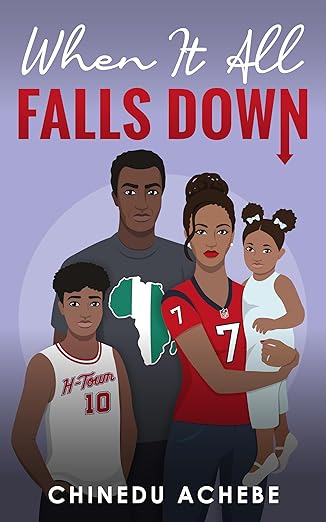 Newnaija.com.ngwp-content/uploads/2024/10/WHEN-IT-ALL-FALLS-DOWN-187×300.jpg 187w” sizes=”(max-width: 500px) 100vw, 500px”>
Newnaija.com.ngwp-content/uploads/2024/10/WHEN-IT-ALL-FALLS-DOWN-187×300.jpg 187w” sizes=”(max-width: 500px) 100vw, 500px”>
Chinedu Achebe’s newest title “When It Falls Down”, immediately grabs attention for its emotional resonance. It suggests moments when life, relationships, or society hits a breaking point. That’s exactly what Achebe explores — a world where things fall apart, both personally and collectively. The story follows Obi and Nkechi Ifeanyi as they try to rebuild their fragile marriage in the aftermath of couples therapy, all while raising their children in a pandemic-stricken America fraught with racial tension and political unrest. Through their experiences, the novel invites readers to reflect on those moments when life feels overwhelming and how we find the strength to pick up the pieces. Achebe titled the book “When It Falls Down” to set the stage for a heartfelt exploration of family, identity and resilience in the face of crises we can’t always control.
Achebe centres Obi and Nkechi’s marriage, hinting at a fracture that has undergone severe mending before the novel begins. He portrays their relationship with a raw honesty that feels both painful and relatable. Though their therapy sessions are in the past, the weight of rebuilding trust still hangs heavy between them. It’s interesting how Achebe weaves this delicate yet crucial aspect of marriage into the narrative. It commands an emotional depth and openness that is rarely talked about.
The novel also explores the Ifeanyi family’s conflicts in the broader context of social change. The book takes place during a volatile period in American history, where the pandemic exacerbated issues of inequality, identity and personal fulfilment. The Ifeanyis, living in Houston, Texas, are no strangers to these struggles. Their marriage is tested, and the tension between preserving cultural heritage and integrating into a society often indifferent to that heritage is ever-present. Achebe skillfully taps into the anxieties of immigrant families trying to hold on to their identity amid the chaotic swirl of American life.
Achebe explores how Black immigrants experience the pressures of living in a racially divided America, where even within the Black community, issues of belonging, identity, and cultural pride are constantly questioned. The novel’s reflections on race are particularly poignant in its examination of events like the death of George Floyd, which catalyse conversations about systemic racism and the urgent need for social justice. Though sometimes overly expository, these discussions provide valuable insight into the intricacies of racial identity and relationships. Regardless, the story offers a unique perspective on the immigrant experience during a time of immense social and political upheaval. The COVID-19 pandemic is not just a setting but an integral part of the story. The virus is a constant presence in the Ifeanyis’ lives, shaping their decisions and reflecting the fear and uncertainty felt by many families during this period.
The novel also highlights the importance of storytelling as a means of preserving cultural history and identity, mainly through the character of Uncle Ugo. His reflections on his experiences during the Biafran War underscore the significance of telling our stories as a way to remember the past and connect with the present. This theme resonates deeply in a society where a singular perspective often dominates narratives, and Achebe emphasises the power of individual stories to foster understanding and empathy.
While Achebe addresses important themes, the novel doesn’t quite deliver on its promises. It sets out with a great premise but needs to be more cohesive. The conversations between characters cover big topics but tend to over-explain, which pulls back from the story’s emotional depth, making it harder for readers to connect with the characters.
Consequently, Achebe’s writing is straightforward, focusing more on content than on literary flourishes. This simplicity allows the subject matter to shine through but also means the prose can sometimes feel flat. There are moments where the narrative would benefit from more descriptive detail or emotional resonance to elevate the stakes and draw readers deeper into the story. The characters’ internal lives, though explored through their dialogues, could have been more vividly portrayed through action or introspection, adding layers to their experiences.
“When It Falls Down” is a thought-provoking exploration of marriage, race, and the immigrant experience in a turbulent time. The novel deserves recognition for its willingness to engage in difficult conversations. It’s a book that invites reflection, not just on the struggles of the Ifeanyi family but on the broader societal issues that shape their lives. For readers seeking an introspective read that mirrors modern life’s challenges, “When It Falls Down” offers plenty to think about.
The post BN Book Review: When It All Falls Down by Chinedu Achebe II Review by The BookLady NG appeared first on Newnaija – Showcasing Africa to the world. Read today!.
